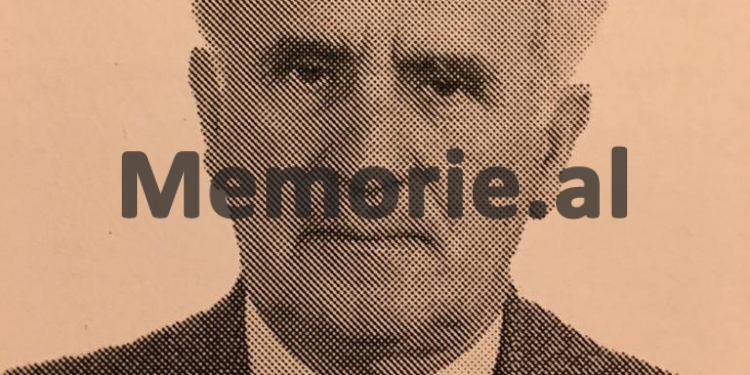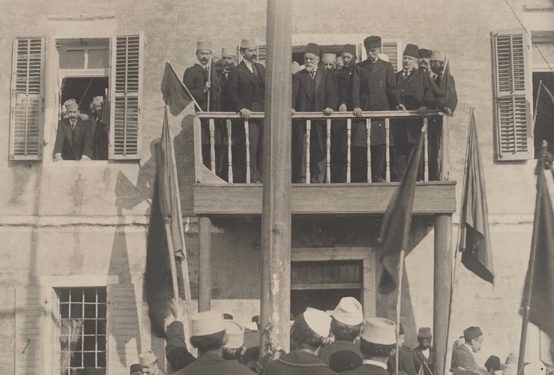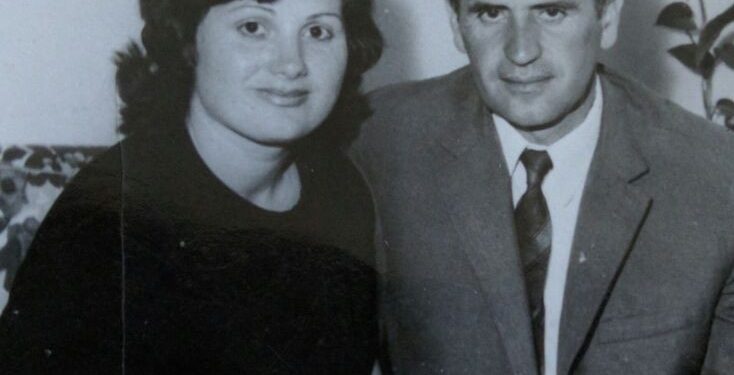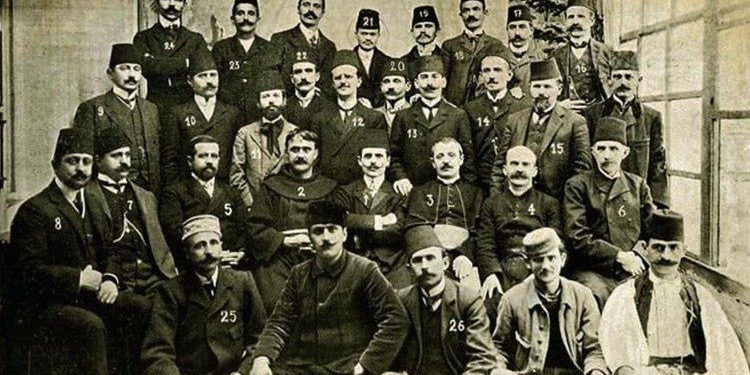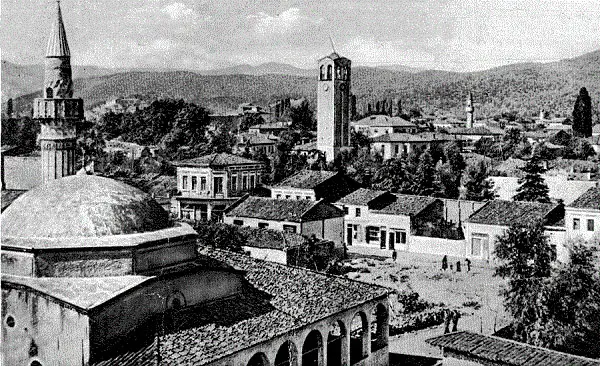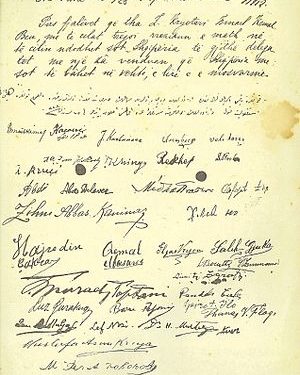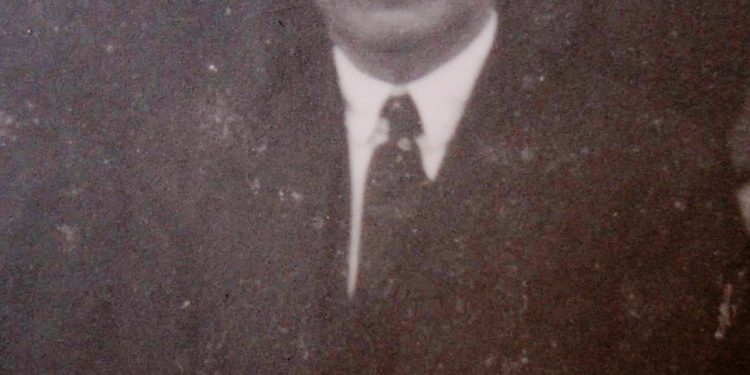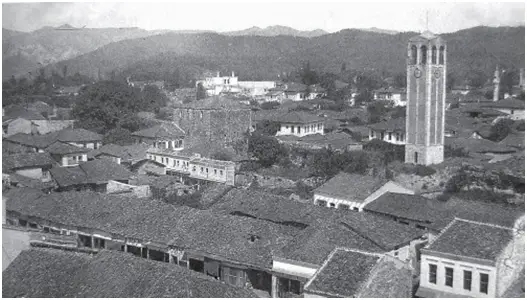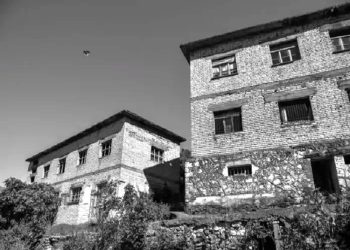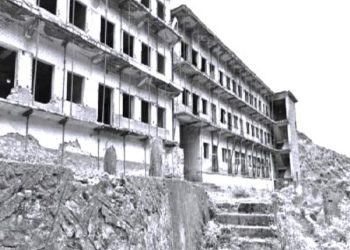Dashnor Kaloçi
Memorie.al publishes the unknown story of the patriotic bey of Elbasan, Qemal Karaosmani, a descendant of one of the rich and patriotic families of that city, who during the period he studied at Istanbul University for Civil Administration and Economics, worked closely with Murat Toptan and the brothers, Frashëri, whom he often visited at their home in Kara Toporak. His graduation in Istanbul and appointment in the Prefecture of Ioannina, where he did not stay long and returned home serving as Director of Cadastre in the city of Berat, where he worked closely with Aziz Pasha Vrion and Qemal Vrion, to spread national feelings and Albanian language. His participation in the Congress of Manastir in 1908, where he met Feim bej Zavalani, Gjergj Qirjazi and Bedri Pejani, Aleksandër Xhuvani, Babë Dudë Karabunara, Sulo Resuli, etc., with whom he contributed to the opening of the Normal School of Elbasan. Rare testimonies of his nephew, Bulent Teki Tela, regarding the memories of his grandfather that were first published in the newspaper “Arbëria” (dt. 28 November 1936), where he tells how he was charged and accompanied Ismail Qemali from Durrës to raising the flag in Vlora, where he signed the act of Independence and served as its chief secretary and minister of agriculture. How he was honored by the Zog Monarchy as a patriot and patriot and was persecuted by the communist regime of Enver Hoxha, forcing him to commit suicide!
“Although my grandfather, Qemal Karaosmani, or as he is otherwise known by the surname Elbasani, was the man who in November 1912 had accompanied Ismail Qemali from Durrës to Vlora, and had also signed the act of Independence, being also the Chief Secretary of the Elder of Vlora, Minister of Agriculture in his cabinet and then deputy and Mayor of Elbasan, throughout the period of the communist regime of Enver Hoxha, his name not only was never mentioned in history books or various anniversaries of the Day of the Flag, but on the contrary, since 1945, his house and all the property he had were seized from him, so much so that they forced him to commit suicide. After that spiritual shock left without a home and katandi, he left Elbasan and settled with his son, Masari, who lived in the city of Kavaja where he died on August 5, 1948, after suffering for a long time in bed. Even after his death, all five children, four married girls and his son, Masari, suffered the class war and were treated as a reactionary family. “This is what Bulenet Tela, the grandson of Qemal Karaosmani (son) testifies exclusively for Memorie.al. of the girl), who tells the whole story of his grandfather, a patriotic bey from Elbasan, who: after graduating in Istanbul for Civil Administration and Economics, returned to Albania and became involved in the political life of the country, making a contribution great as a patriot, especially in November 1912, when he was charged and undertook to accompany Ismail Qemali to Vlora.What was the origin and past of Qemal Karaosmani, what contribution did he make to the Declaration of Independence and how was he treated by King Zog and the communist regime of Enver Hoxha?
Who was Qemal Karaosmani?
Qemal Karaosmani, or as he is known by the surname Elbasani, was born in 1875 in the city of Elbasan, where the early origin of the Karaosmani family is from, one of the most famous houses of that city. It is not known exactly when the Karaosmans settled in the city of Elbasan, but it is thought that at least since the beginning of the 17th century, they have lived there in the “Spalikore” neighborhood, where Qemali’s father, Shazivari, was born., Qemali himself, as well as his children, grandchildren and great-grandchildren. Being a family of beys and quite rich, Shazivar Karaosmani created the opportunity for his son, Kemal, to be educated in Turkey. In this regard, his nephew (daughter) Bulent Teki Tela, testifies: “My grandfather, Qemal Karaosmani, attended high school and university studies in Turkey and completed them in the last years of the twentieth century. In the 19th century, graduating from Istanbul University of Civil Administration and Economics, while studying in Turkey, he came in contact with some of the most prominent Albanian patriots and figures of the National Renaissance, such as Murat Toptani., with whom he formed a close friendship.Together with Murat, he went and visited the house where the Frashëri brothers’s family lived in Kara Toporak, as they had previously met Naim’s daughter, Asien. was appointed to the Prefecture of Ioannina, where he did not stay long, after being transferred to the city of Berat, being appointed Director of the Cadastre.In the city of Berat, Qemali worked closely with Aziz Pasha Vrioni and Iljaz Vrioni, with whom he tries and lu invited a lot for the spread of national feelings and the Albanian language. Based on his contribution to the spread of Albanian education, in 1908, Qemali was invited as a delegate to the Congress of Manastir, where he defended the alphabet that was later approved by that congress. During that time, he went to the city of Skopje, where he met and cooperated with other patriots such as Feim Zavalani, Gjergj Qirjazi and Bedri Pejani. A great influence on Qemali, had his cousin Aqif Pasha Elbasani, with whom he collaborated in organizing the Congress of Elbasan and for the opening of the Normal School of that city. Also, in the years 1909-1910, when he was in Berat, he greatly expanded his activity for the benefit of the Albanian cause, being closely connected with other patriots, such as: Baba Dudë Karabunara, Sulo Resuli and Aleksandër Xhuvani, with him who he made great efforts to spread the Albanian language. In that period, through Kristo Karbunara, he was closely connected with the Albanian societies of Bucharest and Egypt, from which he received books and newspapers in the Albanian language and distributed them for free in the districts of Berat, Skrapar and Lushnja “, says Bulent Tela, regarding the past and patriotic activity of his grandfather, Qemal Karaosmani, in the first years of the last century.
Sign the Act of Independence and head
Given the great contribution given by Qemal Karaosmani for the benefit of the Albanian cause, in November 1912, he was elected as a delegate to the Assembly of Vlora where the Independence of Albania would be proclaimed and was appointed to accompany Ismail Qemali from Durrës to in Vlore. Regarding that major event in the history of Albania, Qemal Karaosmani, has kept his memoirs, which he published in the period of the Zog Monarchy, in the newspaper “Arbëria” (dt. 28 November 1936), where among other things he wrote “Although I wanted to publish this little story for a while after my death, but due to the constant insistence of Mr. Reuf Fico, my dear colleague from Vlona, I was forced to publish it this year on the occasion of the twenty On January 20, 1912, a telegram came from Vlona, with the signatures of Elmas Kanina and Et’hem Vlona, to the Municipality of Berat, stating: “The translation of the telegram we received yesterday from Ismail Qemal Bey from We are transmitting Vienna as follows: “I come with the first steamer. The future of Albania was secured. You had faith in the fate of the Homeland to act in good relations together and fraternally, to ensure the continuation of the settlement of issues general and keep calm and call on every side legally greet Atnore “. This telegram made a great impression on you, rejoicing the hearts of all the people of Berat, who were in poison and sorrow, not knowing anything about the future fate of the beloved Homeland. After a few days comes a telegram with the signature of Bektash Cakrani with friends, again from Vlona, to the late Aziz Pasha Vrioni with friends, where it was said: “Ismail Qemal Bey goes to Durres the next day, send one and horses to get it After this telegram, we gathered at the house of the late Aziz Pasha, and discussed the question of who should come and take Ismail Qemal Bey, and escort him to Vlona. all that was there, they marked me and I gladly accepted it. As I got ready, the next day I left for Durrës, taking with me four people from my people and three spare horses. On Thursday we left Berat and slept in Lushnja, and from there we left at night for Durrës, because the rails were not broken and the day was very short. The former road was completely destroyed, with great effort from the mud and the waters we traveled as much as we could and there after dinner we ended up in Durrës, how I arranged the people in the inns, I went out and I asked him if Ismail Qemal Bey had come? I was told that he had come and was staying at the Aziz Pash Vrioni Hotel by the sea. Then with great joy I ran and went to the hotel, where I met the Elder and his companions, who had gotten off the steamer. That night I slept there and we talked about the direction of the trip, which we would do the next day and we decided to leave Lushnja, after the people of Lushnja had begged me and insisted that I bring the Elder there, that they would be prepared a magnificent reception. I secured for the people of Lushnja the journey of Ismail Qemal Bey to their city, after the other road went through the hills and you did not cross the waters that had flowed from the swamp of Tërbuf. Without leaving Durrës, I realized that they wanted to do something against Ismail Qemal Bey, those who wanted Turkey and pushed by the Turkish authorities, but the help and patriotism of Mr. Hamid Toptan, who is in charge of the reserves, I stopped him and did not allow him to make any move. Delegates from Tirana and Kruja, Mr. left with us from Durrës. “Abdi and Murat Toptani and Mustafa Kruja and others, as well as the delegates from Durrës, such as Musta Ali Ibrahimi and Abas Çelkupa, came after us”, it is said in the first part of the memoirs of Qemal bej Karaosmani, regarding the company he accompanied Ismail Qemali to Vlora, where after signing the act of Independence and serving as its chief secretary, he was appointed and worked as Minister of Agriculture in the government of Vlora.
How King Zog honored Karaosmani as a patriot
Around 1900, Qemal Karaosmani married Aishe Resuli from the well-known family of beys of Berat, whose brother, Ahmet bej Resuli, was one of the most listened to of that house. From that marriage, they had six children: Masari, Hadija, Qamurani, Shehriaja, Behija and Aliu. The eldest son, Masari, was educated in Paris for Agronomy and one of the main reasons that forced his father, Qemali, to send him to that branch, was to return to Albania and deal with the modernization of his agricultural farm. that the family owned, as he did and after 1944 until his death, he worked in Kavaja as an agronomist. While Qemali’s four daughters were educated in the city of Elbasan and took care of the family, their younger brother, Ali, died quite young. Being a large family and known for patriotic traditions, Qemal Karaosmani also made his friendships with well-known and patriotic families. Thus, the eldest daughter, Hedija, married Skënder Pojani, the son of Orhan Pojani from the city of Korça. The other daughter, Shehriaja, married Ismail Sefa, the son of Nebi Sefa from the well-known family of beys of the city of Lushnja, where Nebiu himself had accompanied Ismail Qemali to Vlora and had signed the act of Independence. The third daughter, Qamurani, was married to Professor Teki Tela, from the city of Elbasan, who in 1924, had completed her higher studies in Mathematics in Vienna. The Tela family were close cousins of the family of Aqif Pasha of Elbasan and the Bicaks called Qemal Karaosmani uncle. While Qemali’s fourth daughter, Behija, married a boy from the well-known Karaiskaj family of Bilisht, Korça, who was called Mazllum and was later killed in the war and declared a martyr of the homeland. The eldest son, Masari, married a girl from the famous Berat family. Throughout the period of the Bird Monarchy, Qemali has been known as one of the beys who had excellent relations with his farmers. Also, during that period, Qemal Karaosmani was honored on all the anniversaries of Flag Day, being given the place he deserved as one of the signatories of the act of Independence of Albania.
1945, persecution of Karaosman and family
But while the regime of the Zog Monarchy honored Qemal Karaosmani as one of the patriots of the Declaration of Independence, that did not happen with the communists who came to power in 1944. In this regard, his nephew, Bulent Teki Tela, testifies: At the beginning of 1945, the communist regime that came to power took a very hostile attitude towards Qemal Karaosmani and his family, considering them as “reactionary beyle families.” At that time, our grandfather, Qemal, was confiscated and nationalized all the property he had, including the big house in the “Spalikore” neighborhood of the city of Elbasan.Because of the attitude that the communists held towards him, Qemali went into a deep spiritual shock and twice attempted suicide Afterwards, Qemali was forced to leave Elbasan and move to live with his son, Masari, who at the time lived in the town of Kavaja, where he was locked inside his house and engaged only in studies. , pas had at its disposal a very rich library and had a fairly large archive of official documents. Likewise, not only was Qemali alive, but also in later years, his name was never mentioned in the history books and he was never commemorated on Flag Day anniversaries. In the city of Kavaja, Qemali lived until 1948 and at that time he closed his eyes forever, leaving this life with a great sorrow in his heart. But even after his death, the communist regime maintained the same attitude towards his children, who had many problems because they were considered as children of beys coming from wealthy families. On the occasion of the 50th anniversary of the Declaration of Independence, Ferit Vokopola went to the house of Qemali’s son, Masari, who lived in Kavaja, and took from him the entire family archive, together with the pen that had signed the Declaration of Independence act on 28 November 1912, which is still in the National Historical Museum of Albania “, concludes the story of Mr. Bulent Tela, regarding the story of his grandfather, Qemal Karaosmani, one of the Albanian patriots of the period of Independence, who was persecuted by his family from the communist regime of Enver Hoxha, for the sole reason that he came from the rich./Memorie.al




